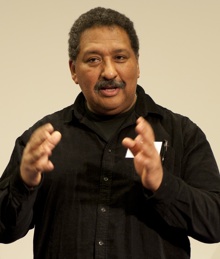Herr Gonzalez, Sie sind Projektleiter des Waadtländer Programms „Ça Marche! Bouger plus, Manger mieux!“ Was sind im Wesentlichen Ihre Aufgaben?
Ich wurde im Rahmen des kantonalen Programms eingeladen, ein Projekt zur Förderung von Bewegung und gesunder Ernährung zu entwickeln und umzusetzen, das sich an Populationen mit Migrationshintergrund richtet. Nächstes Ziel ist nun, das multikulturelle Projekt „Mon Assiette, mes Baskets“ in der Migrationsbevölkerung und in den organisierten Gemeinden zu verankern. Voraussetzung, um persönliche Themen wie Übergewicht, Ernährung, Bewegung und körperliche Betätigung überhaupt ansprechen zu können, ist der Aufbau von Beziehungen zwischen den Projektpartnern und Teilnehmenden. Ich versuche, die Aktivitäten soweit wie möglich für die Vielfalt der Migranten und der Nicht-Migranten zu öffnen. Gemeinsam gehen wir drei Schwerpunkte an: Um fit zu werden, praktizieren wir Nordic Walking, also das Gehen in der direkten Umgebung (Stadt, Region), daneben gibt es den Tanz, thematische Ausflüge und viermal jährlich die Aktion „Ich zähle meine Schritte“. Ziel ist es, für mehr Bewegung im Alltag zu sorgen beziehungsweise die Bewegung im Alltag aufzuwerten. Beim Thema gesunde Ernährung und Kochen sowie beim Austausch über Strategien zum Einkaufen kommt eine Reihe externer Partner zum Einsatz. Ebenso beim letzten Schwerpunkt, der sich mit Fragen der Gesundheit, der Gesundheitsbilanz und der Vermittlung nützlichen Wissens befasst.
Dieser kurze Überblick zeigt, wie unterschiedlich meine Tätigkeiten sind. Ich widme mich dem Aufbau von Beziehungen und Kontakten, bin vor Ort, organisiere, plane und pflege die Zusammenarbeit mit unseren Partnern. So kostbar meine Erfahrung im sozialen Bereich ist, so unentbehrlich ist meine Ausbildung als Ingenieur, wenn es darum geht, Projekte und die Arbeit an sich zu strukturieren.
Da ich für die Jahresplanung der Aktivitäten von „Mon Assiette, mes Baskets“ zuständig bin, muss ich auch die kurz- und mittelfristigen Ziele festlegen. Gleichzeitig bin ich permanent auf der Suche nach Partnern, die vor Ort aktiv sind und die ich einbinden kann, und auf der Suche nach finanzieller Unterstützung. Ich muss also bevorzugte Beziehungen zu Schlüsselfiguren im Migrationsmilieu und in den Institutionen aufbauen und damit alle oder fast alle Bereiche abdecken – von der Gesundheit, über den Verbraucherschutz, bis hin zu den öffentlichen, kommunalen und kantonalen Trägern. Besonders nützlich ist, dass das Programm „Ça marche“ bei den Gesundheitsligen eingebunden ist. Das erleichtert die direkte Zusammenarbeit mit Programmen wie „Allez Hop Romandie“ und „Fourchette Verte“. Ich habe das Glück, dass ich ausserdem ein Team sehr dynamischer und offener Kollegen habe. Ich leite die Workshops zur Bewegung und zum Wandern. Ich co-moderiere die Workshops und Treffen zum Thema Kochen und ich betreue die Teilnehmenden. Damit habe ich ausreichend Praxisbezug. Und schliesslich manage ich die Evaluation und schreibe die Tätigkeits- und Geschäftsberichte. Um an beidem Spass zu haben, an der Arbeit vor Ort wie am Management, ist es schon wichtig, das richtige Rüstzeug zu haben.
Was sind aus Ihrer Sicht die grössten Herausforderungen (oder Hürden) bei der Umsetzung eines Projekts?
Um zu verstehen, worum es bei meiner Arbeit geht, muss man bedenken, dass ich im Kontext der öffentlichen Gesundheitsvorsorge handle. Die grösste Herausforderung besteht darin, eine Tätigkeit in die Freizeit der Teilnehmenden einzubringen, die sie bereichert. Es geht darum, Erwartungen zu erfassen, flexibel zu sein und sich anzupassen, um unser Angebot auf den konkreten Bedarf zuzuschneiden. Und natürlich gilt es, die Vorgaben der Geldgeber und die Anforderungen der Praxis miteinander in Einklang zu bringen.
Wie gehen Sie persönlich an diese Herausforderungen heran?
Ohne Flexibilität und Anpassungsfähigkeit geht es nicht. Grundlage sind Beziehungen, Vertrauen und eine Dienstbarkeit, die nicht missbraucht werden darf. Das erfordert grosse Offenheit und Verhandlungsfähigkeit, sowohl gegenüber der Basis (den Teilnehmenden) als auch gegenüber Partnern und Geldgebern.
Welche Tools eignen sich Ihres Erachtens für die Projektleitung?
Ich nutze in der Praxis sehr oft die Technik des Mindmapping, um die Struktur eines Projekts in der Gruppe zu veranschaulichen. Meilenstein-Meetings sind wichtig bei der Feinsteuerung. Aber auch herkömmliche Projektmanagement-Tools wie Gantt-Diagramme oder „Tableau de bord“ sind nützlich. Sie können mit verschiedenen Mitteln oder Anwendungen erstellt werden (Excel, Mind View, XMind, …). Ausserdem gibt es das Projektmanagement-Tool quint-essenz, mit dem sich Projekte gemeinsam online erstellen und definieren lassen, vor allem während der Planung.
Was würden Sie jemandem raten, der noch keine Erfahrung hat und die Leitung eines Projekts übernehmen möchte? Worauf muss er besonders achten?
Ohne den genauen Kontext zu kennen, ist es nicht so einfach, einen Rat zu geben. Aus meiner Erfahrung habe ich jedoch Verschiedenes gelernt. Die tatsächlichen Gegebenheiten vor Ort sind nie so wie in der theoretischen Planung. Das heisst, man muss auch loslassen können.
Dann ist es wichtig, dass man auf die Menschen eingeht, ohne dabei sein Ziel aus den Augen zu verlieren. Dafür muss man den strategischen Elementen und der langfristigen Vision Rechnung tragen. Gleichzeitig gilt es, taktisch wendig zu bleiben, um angemessen und schlüssig reagieren zu können. Wer ein Projekt leitet, muss die Richtung vorgeben – Partnern und Kollegen aber auch vertrauen. Er muss wissen, dass er die Weisheit nicht alleine besitzt, sondern dass er vielmehr den Austausch von Wissen betreut. Um sich seinen Platz und den Respekt der anderen zu verdienen, ist es erforderlich, den anderen Raum zu geben, um sich selber optimal in das Projekt einbringen zu können.


